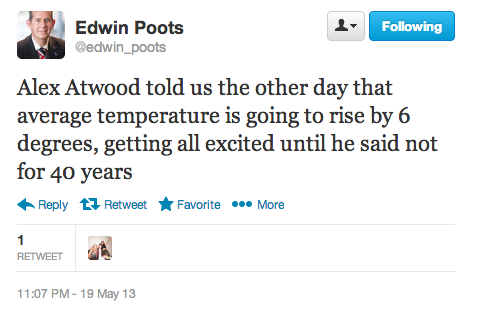Climate Change; No Laughing Matter
A Northern Irish politician recently joked about the impending threat of climate change. David Carroll highlights why climate change is nothing to joke about.
Edwin Poots is the Northern Irish Minister for Health, Social Services and Public Safety. He is in charge of making decisions to “improve the health and social well-being of the people of Northern Ireland”.
Recently, the minister showed a worrying disregard for climate change. He sent a tweet, in reference to something that Alex Attwood, Minister for Environment in the Northern Ireland Executive said. This tweet stated “Alex Attwood told us the other day that average temperature is going to rise by 6 degrees, getting all excited until he said not for 40 years”. This comment undermines that fact that climate change is one of the greatest threats to our society and our health. We as a society must acknowledge the problem and strive to find solutions, rather than making cheap jokes that undermine the efforts of everyone working to create a healthy future.
 Not only is Mr Poots the current minister in charge for health, but also he previously held the position of minister for the environment for two years between 2009 and 2011. I find it baffling that someone that has been in charge of both health and the environment can joke about climate change.
Not only is Mr Poots the current minister in charge for health, but also he previously held the position of minister for the environment for two years between 2009 and 2011. I find it baffling that someone that has been in charge of both health and the environment can joke about climate change.
With this flippant humour, it seems Mr Poots doesn’t realise that over the next century, climate change is likely to become one of the most critical determinants of health over the course of this century. It is a complex set of trends and processes, and is already causing more extreme weather such as floods and droughts, and more heat waves – like the 2003 one which killed approximately 70,000 people in Europe.
Undoubtedly, as a result of climate change, people will die; in fact, rigorous epidemiological research conducted by the WHO found that even the (relatively modest) warming seen from 1970-2004 estimate – and specified that it was a conservative estimate – that climate change was was responsible for an extra 140,000 deaths per year during that period. In that context, perhaps this isn’t something a minister for health should joke about.
Last summer, a weeklong heat wave killed 82 people in New York City. 82, that’s 11 people a day. Furthermore, in last month’s edition of Nature Climate Change, researchers projected future seasonal patterns in temperature-related deaths under a range of emission scenarios and climate models. They found a net annual increase in mean temperature-related mortality in New York City of between 5.3 percent and 6.2 percent by the 2020s, depending on the emissions scenario used, and between a 15.5 and 31.0 percent increase by the 2080s. A ticking time-bomb if I ever saw one.
Not only is this a problem of the global north, climate change will have the greatest impact on the poorest peoples in the world today. Climate change is likely to add to the burden of poverty and existing diseases such as diarrhoea, malaria and malnutrition in low-income countries. In a world where growing season temperature has a 90% probability of exceeding even the most extreme temperatures seen during 1900 to 2006, it’s not difficult to predict that food yields may fall significantly, putting millions more at risk of starvation. The poor housing conditions and infrastructure in many countries are highly vulnerable to extreme climatic events. These effects, combined with significant economic impacts and rising sea levels, could well lead to mass migration, creating new tensions and acting as a driver of conflict.
Climate science is complex and there are still some uncertainties, but at the end of the day the greenhouse effect is well established, as is the fact that CO2 concentrations are rising. It really takes a leap of imagination to think that the Royal Society, IPCC, National Academy of Science and countless other bodies have all got it wrong whilst a handful of so-called experts, many with links to the fossil fuel industry, are correct. While the science isn’t perfect, it’s overwhelmingly conclusive that climate change is real, it’s man-made and we need to do something about it. Even the most conservative estimates are profoundly disturbing and demand action to cut emissions.
A problem in acting on it is that climate change is difficult. Climate change seems too big, too complex, too unpredictable, too global, and too distant for us to be able to influence. If you think about it, it’s tempting to give up and to bury our head in the sand when confronted by this prospect of human catastrophe, of this disaster. COP15 failed to reach a binding agreement, some argue that Kyoto failed and we have missed countless opportunities to tackle climate change. Despite this, we cannot just ignore that this problem exists; unfortunately this is what some of our elected representatives appear to be doing.
I tweeted Mr Poots highlighting my concerns in a hope to start up dialogue. As of yet I have had no reply. While this blog only came as a result of a single tweet, I feel it’s a great way to initiate dialogue about the health effects of climate change; it may be that Mr Poots does recognize the potential for severe impacts and didn’t intend his tweet to undermine the call for climate action. The best way to confront problems like this is to talk about it. To get input from all the stakeholders. Many hands will make light work.
Professor Anthony Costello from the UCL Institute for Global Health stated in 2009 that “failure to act will result in an intergenerational injustice, with our children and grandchildren scorning our generation for ignoring the climate change threat – with moral outrage similar to how we today look back on those who brought in and did nothing to stop slavery”.
Climate change is going to be catastrophic, undoubtedly the biggest threat to our society. If we sit and do nothing, if we ignore climate change, the planet will go on a journey that we will not be able to return from. If this happens, we as a society will be responsible for the death of millions and unprecedented socio-economic destruction.
Action on climate change was urgent 30 years ago, now it’s an emergency. We need the health community and health ministers to be at the centre of these efforts. I hope Mr Poots will publicly acknowledge the threat of climate change and work to tackle this problem, before it is too late.
David Carroll is a third year medical student at Queen’s University Belfast. He can be found on twitter as @davidecarroll.
The author has declared that no competing interests exist.

Perhaps politicians are unable to address this environmental catastrophe. It maybe that this must become a grass roots movement across the globe. If I had a choice between avoiding terrible hurricanes , preventing the early deaths of my grandchildren and countless millions world wide by driving my car one day a week the choice is a no brainer. Let’s awake and educate the masses and if we all elect to keep our heads in the sand and ignore the extinction of most species on the planet including our own so be it.
In the throes of violent ocean storms and devastating tornadoes the realization that government and the oil industry intentional destroyed our planet killing billions will be of little consequence.
It is sometimes hard to know where to begin when commenting on articles such as this blog. I used to be surprised when reading articles with many unsubstantiated facts but sadly no longer. First the reported claim by Alex Attwood that temperatures will rise 6 degrees C over the next 40 years. I don’t know if Alex Attwood made this statement or not. However, I do know that there are very few, if any, scientists who would support such a claim. The climate is changing and temperatures have risen a shade under 1 degree C over the past century. There is absolutely no evidence that this rate will accelerate to give another 6 degrees C in the next 40 years. Even those GCM models that predict very high climate sensitivities don’t come close to a 6 degree C rise in 40 years. Scientists in all disciplines have to start to call such meaningless statements out for what they are, a fiction and hyperbole with no basis in scientific evidence.
The blogger then compounds his message by making statements that the trends in climate are producing more extreme weather. Can he tell us when, where and the evidence that this is caused by anthropogenic climate change? Virtually all the evidence is that there is no change in the frequency or magnitude of extreme weather events.
We’re currently in a period in which global temperatures have not changed for 16 years. The latest peer reviewed science estimates that climate sensitivity lies close to 1 degree C per doubling of CO2 concentration. The implication is that the net feedbacks in the system are close to neutral. If this is so then warming over the next century might lead to a further 1 to 2 degrees temperature rise.
I don’t know if this is catastrophic as the writer suggests but doubt it. There are many potential benign effects of higher CO2 levels and warmer temperatures. Fewer deaths in winter due to cold, increased primary productivity in the biosphere including increased crop yields etc. In short I do not know what the ‘goldilocks’ temperature for the planet and human populations are. Does the blogger? If history is anything to go by then humankind has thrived under warm conditions and suffered during periods of cold.
Our understanding of climate is poor and our projections of the effects of a changing climate at regional levels on the ecosystem, human health, agricultural production etc. are even weaker. Doomsday scenarios and apocalyptic biblical language does nothing to further the debate which should be based on rational debate and use of the scientific method.